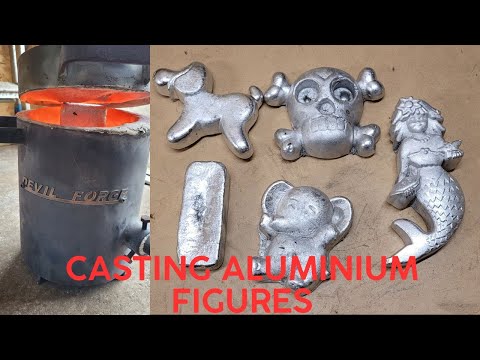Fascination About Alcast Company
Table of ContentsSome Of Alcast CompanyFascination About Alcast CompanyTop Guidelines Of Alcast CompanyAlcast Company Fundamentals ExplainedAlcast Company Fundamentals ExplainedThe Facts About Alcast Company Uncovered
Chemical Comparison of Cast Aluminum Alloys Silicon promotes castability by decreasing the alloy's melting temperature and improving fluidity during spreading. Additionally, silicon adds to the alloy's toughness and wear resistance, making it useful in applications where sturdiness is important, such as automotive components and engine elements.It additionally boosts the machinability of the alloy, making it less complicated to process into ended up items. In this method, iron contributes to the overall workability of aluminum alloys.
Manganese contributes to the strength of light weight aluminum alloys and improves workability. Magnesium is a lightweight aspect that provides stamina and impact resistance to light weight aluminum alloys.
Getting The Alcast Company To Work
It enables the production of light-weight parts with outstanding mechanical residential or commercial properties. Zinc boosts the castability of aluminum alloys and helps control the solidification procedure throughout casting. It improves the alloy's stamina and solidity. It is frequently found in applications where detailed forms and fine details are required, such as attractive spreadings and particular automobile components.

The main thermal conductivity, tensile toughness, return strength, and elongation differ. Select suitable resources according to the performance of the target product created. Amongst the above alloys, A356 has the highest possible thermal conductivity, and A380 and ADC12 have the lowest. The tensile limit is the opposite. A360 has the most effective return toughness and the highest possible prolongation price.
Some Known Factual Statements About Alcast Company

In precision casting, 6063 is fit for applications where elaborate geometries and top quality surface finishes are extremely important. Examples include telecommunication enclosures, where the alloy's superior formability enables for sleek and aesthetically pleasing styles while keeping architectural stability. In the Lighting Solutions sector, precision-cast 6063 elements produce stylish and efficient lighting fixtures that need detailed forms and great thermal performance.
It leads to a finer surface area coating and better deterioration resistance in A360. Additionally, the A360 exhibits remarkable elongation, making it optimal for complicated and thin-walled components. In accuracy spreading applications, A360 is well-suited for markets such as Customer Electronics, Telecommunication, and Power Devices. Its boosted fluidness enables detailed, high-precision parts like smart device housings go now and interaction device real estates.
An Unbiased View of Alcast Company
Its unique homes make A360 a useful selection for accuracy spreading in these sectors, enhancing product resilience and high quality. Foundry. Aluminum alloy 380, or A380, is a widely used casting alloy with several unique features.
In accuracy spreading, aluminum 413 beams in the Consumer Electronic Devices and Power Equipment industries. This alloy's premium deterioration resistance makes it an outstanding choice for exterior applications, guaranteeing long-lasting, sturdy products in the stated markets.
Some Known Factual Statements About Alcast Company
As soon as you have made a decision that the light weight aluminum die casting process is ideal for your project, a crucial next step is selecting the most proper alloy. The light weight aluminum alloy you choose will substantially influence both the casting process and the buildings of the final product. Due to the fact that of this, you must make your decision very carefully and take an enlightened approach.
Identifying the most appropriate aluminum alloy for your application will imply evaluating a large range of characteristics. These relative alloy features comply with the North American Pass Away Casting Association's guidelines, and we've separated them into 2 groups. The initial group addresses alloy attributes that impact the manufacturing process. The second covers characteristics affecting the residential or commercial properties of the final item.
The 45-Second Trick For Alcast Company
The alloy you choose for die casting straight impacts numerous elements of the spreading procedure, like how simple the alloy is to collaborate with and if it is vulnerable to casting defects. Warm cracking, likewise referred to as solidification splitting, is a typical die casting issue for aluminum alloys that can cause internal or surface-level splits or splits.
Specific light weight aluminum alloys are more prone to warm breaking than others, and your choice needs to consider this. Another typical issue found in the die spreading of light weight aluminum is pass away soldering, which is when the cast stays with the die wall surfaces and makes ejection difficult. It can damage both the cast and the die, so you need to look for alloys with high anti-soldering buildings.
Corrosion resistance, which is currently a notable quality of aluminum, can differ considerably from alloy to alloy and is a necessary characteristic to take into consideration depending upon the ecological problems your product will certainly be subjected to (Foundry). Put on resistance is one more residential property typically looked for in aluminum items and can differentiate some alloys